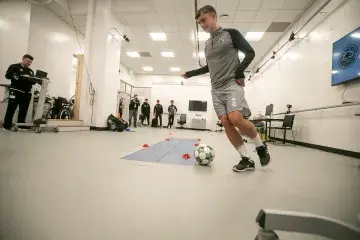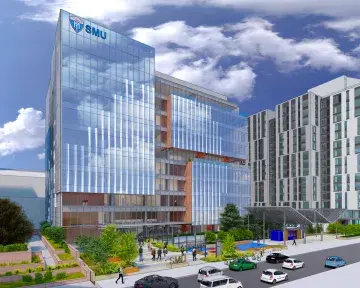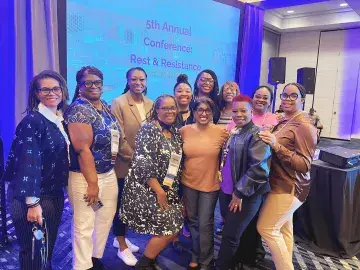SMU Nursing Students Gain Real-World Pediatric Experience Through Summer Camp Partnerships
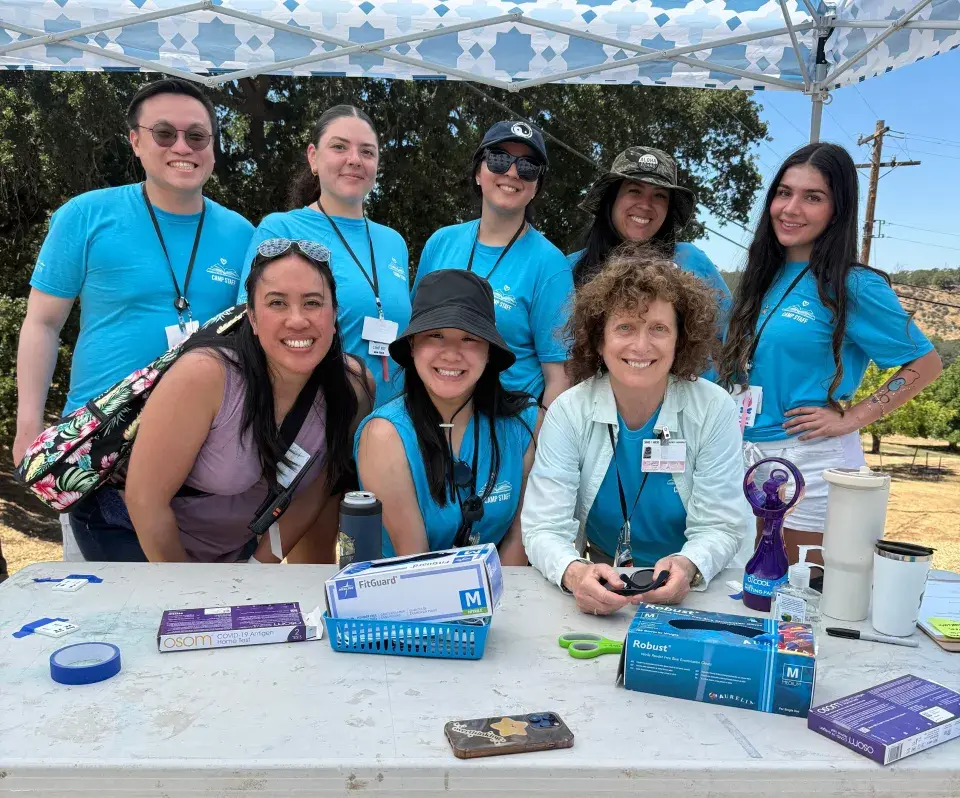
Over the summer, Samuel Merritt University’s Entry Level Master of Science in Nursing (ELMSN) students step away from the classroom and into the unique world of summer camp nursing—gaining hands-on experience while making a lasting impact on children, including those with chronic illnesses.
For ten years, SMU Assistant Professor of Nursing Marjorie Hammer has supervised Oakland nursing students every summer at various camps. The summer camps offer nursing students invaluable learning opportunities in areas such as child growth and development, managing both routine and complex health issues, and embracing the autonomous and creative role of the camp nurse. Professor Hammer remarks, “I love supporting these local community efforts and exposing students to nurses using the full scope of their skills, thinking critically, triaging, and problem solving with little resources, and witnessing the lived experience of children (and their families) coping with chronic illness.” She plans to continue this initiative as the summer camps greatly appreciate and depend on SMU nursing students’ participation.
This summer, A group of thirty-four ELMSN nursing students participated at four camps across Northern California, including three specialty camps that offer care and community for children living with type 1 diabetes, sickle cell anemia, and nephrotic syndrome. For many students and alumni, these camp experiences are transformative—both personally and professionally. Alumni often return as volunteer nurses, driven by the deep sense of purpose and community these camps foster.
Echo Lake Camp
The City of Berkeley’s Parks and Recreation Department brought together 150 children at Echo Lake Camp in South Lake Tahoe. Among the staff and volunteers were SMU’s nursing students, who provided care for a range of general health concerns from splinters, rashes, dehydration, and altitude sickness to homesickness and anxiety—developing clinical confidence in a setting where resourcefulness is key. Students reflected how the experience contributed to their professional growth and clinical skills.
Second-year student Selena Hernandez was reminded of why she chose nursing in the first place, noting that the camp “strengthened [her] confidence in applying therapeutic communication and creative problem-solving in non-hospital settings.” Kelly Pham, another second year student at the camp echoed this sentiment, explaining that working creatively with limited supplies at the camp taught her to “be resourceful and to ask for help when it was needed,” an approach she plans to bring to her career in healthcare.
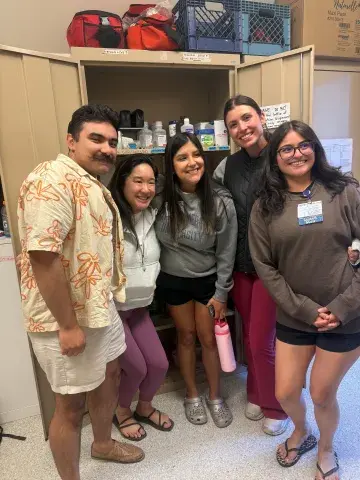
Camp de Los Niños
At the Diabetes Youth Foundation’s Camp de Los Niños, ELMSN nursing students gained experience supporting children with type 1 diabetes. From assisting with nighttime blood glucose checks and administering insulin to performing ketone testing and managing both hypo- and hyperglycemia, SMU students engaged directly in diabetes care, deepening their understanding of management technologies, individualized treatment, and clinical decision-making.
One ELMSN Family Nurse Practitioner (FNP) student, Shraddha Luitel, reflected on the initial challenges of working in a non-clinical setting, sharing that she “was not sure what to expect or what the situations surrounding the high or low blood glucose would be.” She admitted feeling lost at first, questioning how to apply classroom knowledge in a camp environment; however, as the days progressed, her confidence grew. “The situations [were] very different each day,” she said, “so it [required] a lot of decision-making based on what was happening before, during, and after.”
Camp Superstar
Four ELMSN nursing students—Michaela David, Cierra Jones, Yolanda Lares Peña, and Garyuna Roberson—volunteered at Camp Superstar, a specialty camp for children with sickle cell anemia, organized by Sickle Cell Anemia Awareness of San Francisco and held at a campground in Livermore called Camp Arroyo.
Camp Arroyo itself carries a rich history, conceived during the early HIV/AIDS crisis to provide a safe and inclusive space for children living with HIV, a group that faced significant discrimination and stigma at the time. The campground is a state-of-the-art facility nestled in the Livermore hills and, over the years, has opened its doors to support children facing a broad range of serious health challenges, reaching families across the country.
Reflecting on her experience at Camp Superstar, Michaela David shared that while some of the students initially felt uncertain about their ability to succeed as cabin counselors, the support from fellow counselors—many of whom had sickle cell anemia themselves—was invaluable. Cierra Jones emphasized the importance of “giving [herself] grace for not knowing everything.” and remaining open to learning from the children at Camp Superstar. “These kids are resilient,” Cierra shared, noting that they did not let their condition hinder them from simply being kids and enjoying themselves.
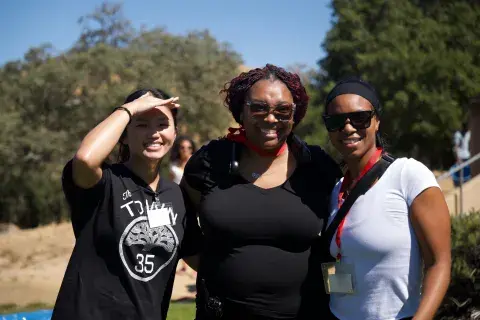
Camp NSF
One particularly powerful partnership this summer was with the Nephrotic Syndrome Foundation (NSF)’s camp also held at Camp Arroyo. NSF is a grassroots organization founded by a parent of a child with nephrotic syndrome, a life-threatening autoimmune kidney disorder.
Professor Hammer and her team of nursing students played a critical role at Camp NSF this summer, supporting medical needs and creating a safe, welcoming environment for campers. In a heartfelt note, the camp director Dana Bicker expressed deep gratitude for their hands-on care. “Your energy, leadership, and generosity made a huge difference,” Dana shared. She remarked that the SMU nursing team’s “efforts are still rippling through the memories and connections made that weekend.”
Second-year ELMSN-FNP student, Galen Lew, shared that his experience at the camp solidified his desire to pursue pediatric nursing, inspired by the opportunity to support the healing process for both patients and their families. Cheryl Beeson, fellow second-year ELMSN-FNP student, commended the environment the camp fostered, describing it as a “safe, inclusive space where kids with nephrotic syndrome can feel ‘normal’ and empowered.” Beyond providing a sense of community for the children, the camp also created space for meaningful dialogue between families and healthcare providers—something Cheryl witnessed firsthand when one parent shared, “I don’t feel alone anymore.”
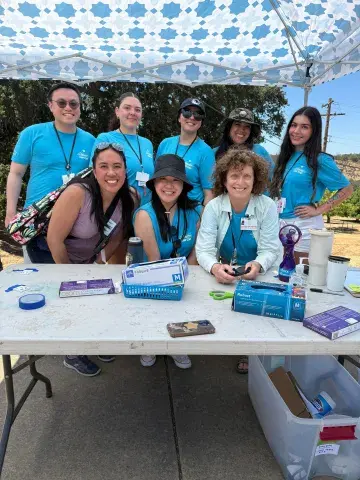
Between supporting children with chronic illnesses and offering moments of joy, SMU nursing students left a lasting mark on the communities they served—and, in turn, found clarity and purpose in their own journeys of becoming nurses. These camp partnerships continue to be a vital component of the ELMSN experience at SMU, offering unmatched opportunities for learning, service, and professional growth that expose students to nursing practice in a dynamic setting.
